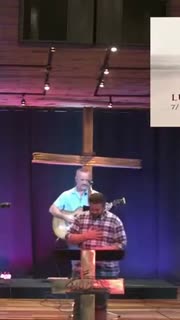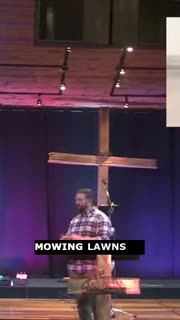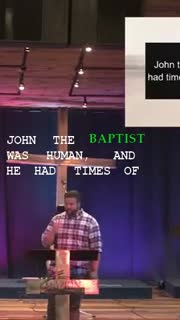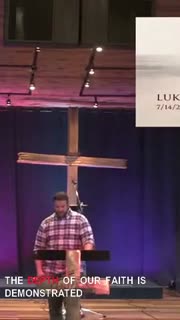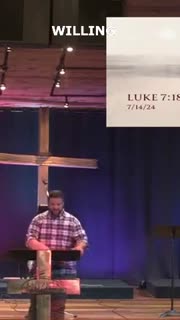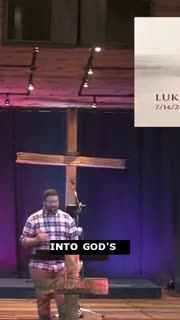Finding Peace and Strength in God's Presence
Devotional
Sermon Summary
Bible Study Guide
Sermon Clips
### Quotes for Outreach
1. "I think sometimes in life we can get stuck on focusing on what we need God to do for us rather than just being with him. We can be stuck on, you know, God you haven't done this, you haven't done that, and we can get stuck in the anxiety of like looking for the things that we want God to do versus just being still and being with him and letting him be with us in those moments, leading us, guiding us. That's where his peace is at church." [46:01] (53 seconds)
2. "Thank you, God, that the joy of heaven is that we get to be fully in your presence and that, God, that you made a way for us now. The curtain was torn in two. Lord God, when you went to that cross and you took our sin upon yourself and you paid for that on the cross, Jesus, it says in your word that the temple, the curtain in the temple that separated mankind from the presence of God was torn in two. Lord God, that we could now have access by the blood of Jesus into the most holy place, your presence, God." [46:01] (31 seconds)
3. "And, Lord, if we're really honest, the answer is you, Jesus. Lord God, the issue is in the hearts of men. The issue, Lord God, is that we are in rebellion against you, God. And that we haven't bowed our knee down to you, Lord Jesus. And so, Lord, we just cry out for our nation. That, God, you would bring an awakening in our nation. Lord God, that the things that, the issues in our nation would bring people to their knees and they would bring them to a place of realizing that, Jesus, you are our hope." [46:01] (31 seconds)
4. "We had people mowing lawns and weed whacking we had people power washing houses people are replacing storm doors and and removing trees and even fixing toilets but through all of that we were showing people the love of jesus and we saw people come to the lord and get saved which is what it was all about and uh and then single moms morning out on saturday you know we had about 35 or so moms that walked into these doors and our whole goal was just to show them the love of jesus and the hope in the gospel." [52:22] (27 seconds)
5. "Repentance gets such a negative connotation, but I see it like this. Repentance is just coming home to where you belong. So you think about the, the prodigal son. The prodigal son went, and he lived however he wanted to, and, and he was so hesitant about coming back home, because what would his father think? What would his father do? You know, maybe he would at least let him become a servant. And so he, he turned, he repented, he came home, and what did the father do? He made him a son again." [01:17:25] (29 seconds)
### Quotes for Members
1. "John the Baptist was human, and he had times of questioning and doubt. He had times of questioning and doubt. As we are reading here in Luke chapter 7, John the Baptist was in prison at this time. He didn't know if he was going to live or if he was going to die. He didn't know the outcome of his life, and he had a lot of time to think, and a lot of time to process. And I'm sure some of the thoughts began to come through his mind of, you know, Jesus, he said, if you're truly the Messiah, then why am I still sitting here in jail?" [01:01:23] (34 seconds)
2. "The question isn't, are we going to face trials? The question is, in those moments of questioning, what are you going to do with your questions? In those moments of weakness, what are you going to do with your weakness? You see, your next point is this, John brought his questions to Jesus, and he awaited an answer. He brought his questions to Jesus, and he awaited an answer. But the reality, church, is that many times, we bring our questions everywhere else first. We bring our questions to Google, don't we?" [01:04:18] (35 seconds)
3. "The depth of our faith is demonstrated by how we go through trials. Listen, there is a way to have victory even in the midst of hardship, even in the midst of trials. I think one of the questions that we have to ask is what is our goal? And where are our eyes looking? Because I think many times as Christians, we think that the goal of our life here on this earth should be a perfect, easy life with no problems, no obstacles, no issues. And for us, that is the goal that we strive for. And when that doesn't happen, our entire bulk begins to get rocked." [01:09:53] (35 seconds)
4. "We need to be willing to get into the word of God and search until we find an answer, because the answers that we're going to find are going to be in this book. We need to be able to talk to others. You know, I love Vanessa's testimony about how when she began to be honest and be vulnerable with her struggles, with other believing Christians that could point her to Jesus, but that was so key in her overcoming the struggles that she faced, the trials that she was facing, and the vices that she was addicted to because of her struggles, that as she began to open up and be vulnerable with others, that God began to peel away the layers, bring healing to her heart, and bring victory in her life." [01:08:33] (40 seconds)
5. "The entrance into God's kingdom is narrow, and very few find it. The entrance is narrow because so many people, you know, the Bible says in Matthew chapter 7, verse 13 through 14, it says, enter through the narrow gate, because wide is the gate, and wide is the road that lead to destruction, and many find it. But narrow is the road, and narrow is the path that leads to life, and only a few find it. See, the reality is that more people than that would, would rather live for themselves, would rather live how they want, and they have pride in their heart, rather than realizing that Jesus is the only way, the only truth, and the only life." [01:16:13] (42 seconds)
Ask a question about this sermon
1. "I think sometimes in life we can get stuck on focusing on what we need God to do for us rather than just being with him. We can be stuck on, you know, God you haven't done this, you haven't done that, and we can get stuck in the anxiety of like looking for the things that we want God to do versus just being still and being with him and letting him be with us in those moments, leading us, guiding us. That's where his peace is at church." [46:01] (53 seconds)
2. "Thank you, God, that the joy of heaven is that we get to be fully in your presence and that, God, that you made a way for us now. The curtain was torn in two. Lord God, when you went to that cross and you took our sin upon yourself and you paid for that on the cross, Jesus, it says in your word that the temple, the curtain in the temple that separated mankind from the presence of God was torn in two. Lord God, that we could now have access by the blood of Jesus into the most holy place, your presence, God." [46:01] (31 seconds)
3. "And, Lord, if we're really honest, the answer is you, Jesus. Lord God, the issue is in the hearts of men. The issue, Lord God, is that we are in rebellion against you, God. And that we haven't bowed our knee down to you, Lord Jesus. And so, Lord, we just cry out for our nation. That, God, you would bring an awakening in our nation. Lord God, that the things that, the issues in our nation would bring people to their knees and they would bring them to a place of realizing that, Jesus, you are our hope." [46:01] (31 seconds)
4. "We had people mowing lawns and weed whacking we had people power washing houses people are replacing storm doors and and removing trees and even fixing toilets but through all of that we were showing people the love of jesus and we saw people come to the lord and get saved which is what it was all about and uh and then single moms morning out on saturday you know we had about 35 or so moms that walked into these doors and our whole goal was just to show them the love of jesus and the hope in the gospel." [52:22] (27 seconds)
5. "Repentance gets such a negative connotation, but I see it like this. Repentance is just coming home to where you belong. So you think about the, the prodigal son. The prodigal son went, and he lived however he wanted to, and, and he was so hesitant about coming back home, because what would his father think? What would his father do? You know, maybe he would at least let him become a servant. And so he, he turned, he repented, he came home, and what did the father do? He made him a son again." [01:17:25] (29 seconds)
### Quotes for Members
1. "John the Baptist was human, and he had times of questioning and doubt. He had times of questioning and doubt. As we are reading here in Luke chapter 7, John the Baptist was in prison at this time. He didn't know if he was going to live or if he was going to die. He didn't know the outcome of his life, and he had a lot of time to think, and a lot of time to process. And I'm sure some of the thoughts began to come through his mind of, you know, Jesus, he said, if you're truly the Messiah, then why am I still sitting here in jail?" [01:01:23] (34 seconds)
2. "The question isn't, are we going to face trials? The question is, in those moments of questioning, what are you going to do with your questions? In those moments of weakness, what are you going to do with your weakness? You see, your next point is this, John brought his questions to Jesus, and he awaited an answer. He brought his questions to Jesus, and he awaited an answer. But the reality, church, is that many times, we bring our questions everywhere else first. We bring our questions to Google, don't we?" [01:04:18] (35 seconds)
3. "The depth of our faith is demonstrated by how we go through trials. Listen, there is a way to have victory even in the midst of hardship, even in the midst of trials. I think one of the questions that we have to ask is what is our goal? And where are our eyes looking? Because I think many times as Christians, we think that the goal of our life here on this earth should be a perfect, easy life with no problems, no obstacles, no issues. And for us, that is the goal that we strive for. And when that doesn't happen, our entire bulk begins to get rocked." [01:09:53] (35 seconds)
4. "We need to be willing to get into the word of God and search until we find an answer, because the answers that we're going to find are going to be in this book. We need to be able to talk to others. You know, I love Vanessa's testimony about how when she began to be honest and be vulnerable with her struggles, with other believing Christians that could point her to Jesus, but that was so key in her overcoming the struggles that she faced, the trials that she was facing, and the vices that she was addicted to because of her struggles, that as she began to open up and be vulnerable with others, that God began to peel away the layers, bring healing to her heart, and bring victory in her life." [01:08:33] (40 seconds)
5. "The entrance into God's kingdom is narrow, and very few find it. The entrance is narrow because so many people, you know, the Bible says in Matthew chapter 7, verse 13 through 14, it says, enter through the narrow gate, because wide is the gate, and wide is the road that lead to destruction, and many find it. But narrow is the road, and narrow is the path that leads to life, and only a few find it. See, the reality is that more people than that would, would rather live for themselves, would rather live how they want, and they have pride in their heart, rather than realizing that Jesus is the only way, the only truth, and the only life." [01:16:13] (42 seconds)

